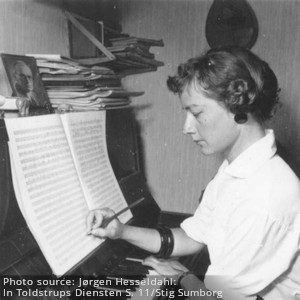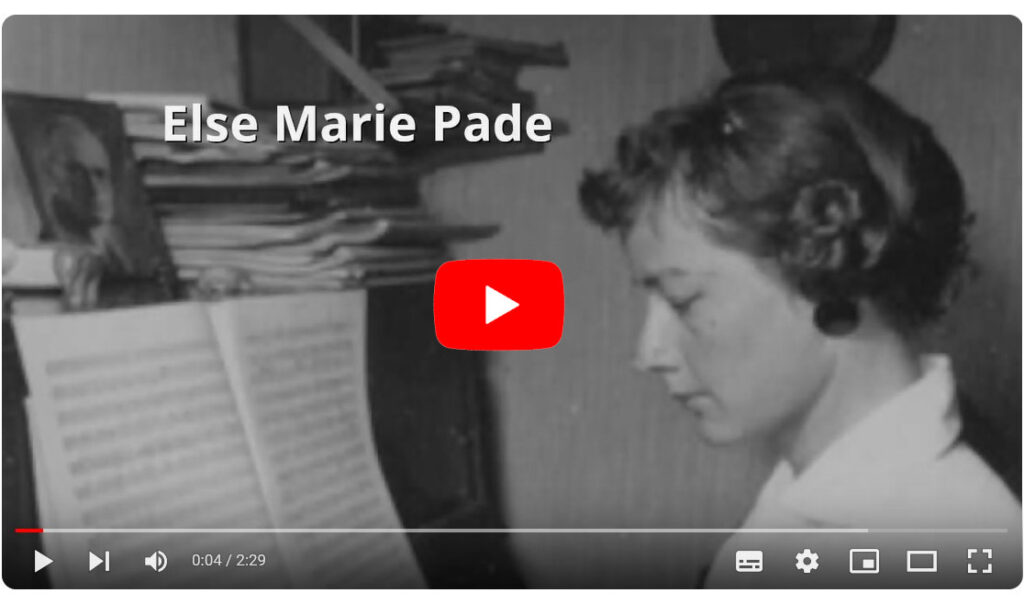
In May 1945, the German Wehrmacht surrendered. The event is commemorated in Schleswig-Holstein, Germany on May 8 and in Denmark on May 5. Back in 1945, resistance fighter Else Marie Pade was interned in the Frøslev prison camp near Flensburg. As composer, she was a pioneer of concrete electronic music. Pade would have celebrated her 100th birthday this year. My poem Copenhagen was written in her honor.
Copenhagen – a prose poem freely adapted from Else Marie Pade’s Symphonie magnetophonique:

Pade’s original work describes 24 hours of everyday life in Copenhagen. Based on her sound collage, I created the prose poem Copenhagen. Click on the above image for a reading on YouTube by actor Philipp von Schön-Angerer of Theater Kiel. The German video has authorized English subtitles. Alternatively use this YouTube link.
Copenhagen
My breath had expanded. A band of mist lay on the fields. The moonlight rested with me on the pillows, when the alarm clock draged me into the bathroom. My dreams became songs under the showerhead. A gentle steam drifted from my coffee and my footsteps over the wooden floor into the beats of the machines: interlocking chimes at the end of the sea – rhythmically grinding from the towers into asphalt-riding city wheels.
Seagulls cried above all streets, and the heroic adventures of my mind blossomed past the voices of children into open office doors. Sleep had now become dreamless. Through all the clattering keybord machines, phrases shot through the light, slipping through my fingers and into raindrops on the window panes: streetlamps and the taillights of machines danced their ballet. The cursor flashed, and from the pinheads on the pinboard, stars shone into the bus driver’s smile after work and into the carefree voices of podcasts that drove with me on the way home through cones of light pass vibrant cars: a crackling of campfires, where we used to sit for tens of thousands of years until night fell upon us and over our trivial days.
And on the last paths, where footsteps walked through puddles past the lightpoles, words stuck to the lampposts, burst like bubbles of soap. I heard paper bags rustling in the corners and saw umbrellas drifting over sidewalks like dandelion clocks. Branches flickered under the street lights with hard shadows as cast by candle flames: a plectrum plucked the colors of the night. And on the brick path in front of my house lay the moon again – this time like fallen snow.
Else Marie Pade’s 100th Birthday – Resistance Fighter And Composer
Else Marie Pade (1924 – 2016) would have turned 100 this year. The Danish composer was born on December 2, 1924 in Aarhus. The Nazis occupied Denmark on April 9, 1940. In 1944 Pade joined an all-female resistance group. She was arrested by the Gestapo on September 13, 1944. From October 23, 1944, she was held in captivity at Frøslev prison camp near Flensburg until liberation on May 5, 1945.
Else Marie Pade’s works are available at Dacapo Records Denmark and can be found on YouTube too. In regard to her life-affirming Symphonie magnetophonique, Pade’s piece Face It sounds like the exact opposite. It uses alienated Hitler speeches.
A Brief History Of Liberation Day In Denmark
On May 8, 1945, the German Wehrmacht finally surrendered. The Second World War came to an end, but in parts of north-western Europe, the retreat had already begun days earlier. On May 4 at 8.35 pm, the British BBC broadcasted a message to Denmark, which was announced by radio newscatser Johannes G. Sørensen in Danish: „This is London. We repeat. Montgomery has just announced that the German troops in the Netherlands, in northwest Germany and in Denmark have surrendered.“
Until then, the Danish people had kept their houses dark in fear of German attacks, sometimes for years. When they heard the news, many pulled down the curtains and placed candles in their windows. These lights are meant to be a sign of hope shining in the dark. Placing candlelights in the windows became a May 4 tradition in Denmark and marks the beginning of Liberation Day celebrations. The official surrender of the Nazis in Denmark came into effect on May 5, 1945. It was negotiated between Field Marshal Montgomery of the Allies and the German Grand Admiral Dönitz in Flensburg. This is how May 5 became Liberation Day in Denmark.
German Responsibility In Schleswig-Holstein
As descendants in the land of the perpetrators, we Germans have a special responsibility. In the state of Schleswig-Holstein close the Danish border, May 8 is officially held in remembrance of the liberation from the Nazi regime. Due to our history, we will never be able to celebrate Liberation Day on eye level with our European neighbors, but what unites us with them today, is joint action for a world where people find the courage to stand up to autocratic behaviour and warlike regimes in order to promote peace and international understanding.
More about Liberation Day in Schleswig-Holstein can be found on the website of the Liberation Day Working Group Initiativkreis Gedenktag 8. Mai. I would also like to thank Ellen Dorn, Isabel Baumert and Philipp von Schön-Angerer of Theater Kiel. Thanks also to Søren Pold of Aarhus University.
